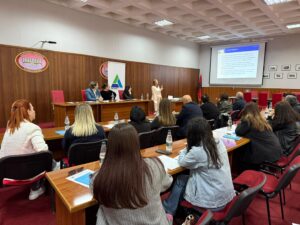NRC 3 Workshop: The European integration process in Albania – opportunities for the involvement of civil society and youth in the negotiations process for social policies, employment, education, and youth, Pogradec, 30 May 2025
 On May 30, 2025, in cooperation with the Pogradec Municipal Council, a workshop was held as part of the National Resource Centre for Civil Society, organised by Partners Albania for Change and Development and the European Movement in Albania. The main focus of the activity was to identify opportunities for the involvement of civil society, activists, and young people working in the fields of employment, social inclusion, youth, and education in the negotiation process and to encourage public information and consultation regarding Cluster 3 – Competitiveness and Inclusive Growth. The workshop brought together representatives of local organizations, activists, academic staff, students, and youth, with the aim of enhancing their knowledge and capacity regarding Albania’s EU integration process, emphasizing the importance of active participation of non-public actors in policymaking and decision-making processes.
On May 30, 2025, in cooperation with the Pogradec Municipal Council, a workshop was held as part of the National Resource Centre for Civil Society, organised by Partners Albania for Change and Development and the European Movement in Albania. The main focus of the activity was to identify opportunities for the involvement of civil society, activists, and young people working in the fields of employment, social inclusion, youth, and education in the negotiation process and to encourage public information and consultation regarding Cluster 3 – Competitiveness and Inclusive Growth. The workshop brought together representatives of local organizations, activists, academic staff, students, and youth, with the aim of enhancing their knowledge and capacity regarding Albania’s EU integration process, emphasizing the importance of active participation of non-public actors in policymaking and decision-making processes.
The event was opened by the Chair of the Pogradec Municipal Council, Manjola Kamolli, who emphasized that local institutions, civil society actors, businesses, and citizens should take a more active and engaged role in the reform-making process within the EU integration context. She highlighted that this process should not be seen as exclusive to the central government or the capital, but as a broad societal effort that affects all sectors and social groups. According to her, now is the time for increased activism, collaboration, and inclusion. Kamolli also pointed out the importance of such initiatives in supporting local organizations that often need more guidance, assistance, and capacity-building opportunities.
Arjola Agolli, Program Director at Partners Albania for Change and Development, presented the mission and work of the National Resource Centre for Civil Society (NRC), which aims to foster cooperation and civic engagement at the local level. She noted that civil society in cities like Pogradec often faces challenges in accessing national policy-making processes, due to the concentration of activities in Tirana. In this light, partnerships with local authorities are essential to broaden participation and empower local actors. Agolli emphasized that initiatives like this one should serve not only as informative spaces but also as platforms to motivate local activists and structures to take on a more active role in decision-making processes.
Nirvana Deliu, Project Director at the European Movement in Albania, shared an overview of Albania’s EU integration process and the potential role of local stakeholders along this path. She stressed the need to extend the EU-related dialogue beyond the capital, involving local communities and making platforms like the Partnership Platform for European Integration more accessible for actors in cities like Pogradec. According to her, by investing in capacity-building and through the support of local government, the influence of non-state actors in shaping and implementing EU-related policies can be significantly strengthened.
Assoc. Prof. Dr. Elda Zotaj, an expert on the European Union, provided an analytical overview of the EU’s approach to the chapters related to education, youth, scientific research, employment, and social inclusion. She drew attention to the remaining challenges in meeting EU standards and the essential role that local institutions can play in translating reforms into the daily lives of citizens. Zotaj highlighted that approximately 75% of EU legislation is implemented at the local level, underlining the importance of collaboration between local governance structures and civil society organizations in reinforcing reform implementation and ensuring an inclusive integration process.
Throughout the discussion, the workshop reaffirmed the importance of engaging local actors and partnering with local authorities to build a more inclusive and sustainable EU integration process. Such initiatives help cultivate a culture of active participation and open dialogue at the local level.
***





